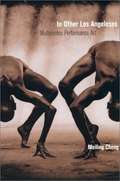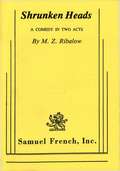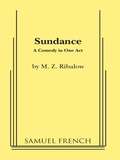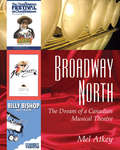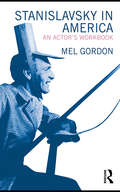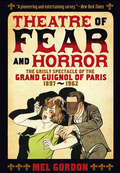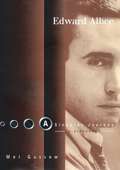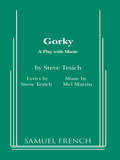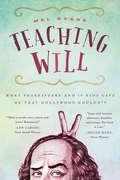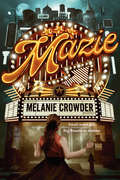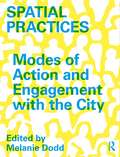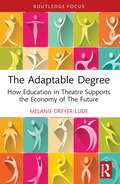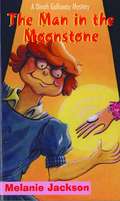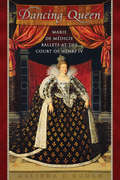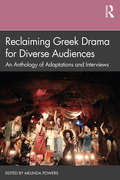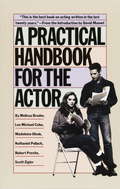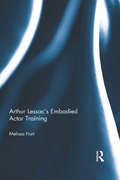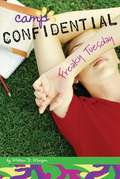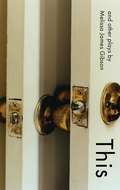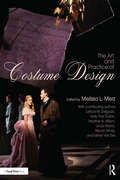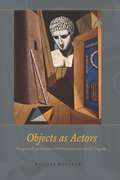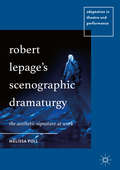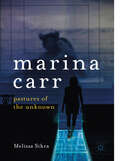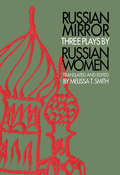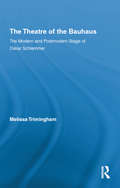- Table View
- List View
In Other Los Angeleses: Multicentric Performance Art
by Meiling ChengThis is a study of contemporary Los Angeles through the lens of performance art, an intermedia visual art that incorporates theatrical elements in presentation. The book proposes to examine the significant roles that performance art has played in shaping, transforming, and delineating the multicultural ecology of Los Angeles.
Shrunken Heads
by Meir Z. RibalowComedy / 3m, 4f / Interior / Dr. Bob Hyde, a successful psychiatrist, just wants to have a quiet, peaceful weekend at his country estate, where he can commune with nature and relax in his Jacuzzi, far away from his patients. No such luck. In burst an assortment of crazed or just plain eccentric characters, from his neurotic to end all neurotics patient Dorothy Putney, to his daughter Caroline who is dropping out of her seventh college to go and live in a tent in Colorado and who has stopped by for moral support and money, to Caroline's mother and Hyde's ex wife Jennifer, a master of facetious wise cracks and particularly adept at draining Dr. Bob of alimony money. When Dorothy's husband Norman, who thinks his wife is having an affair with Hyde, shows up with a gun, this wildly paced farce really hits its stride, and things build and build to an hilarious climax.
Sundance
by Meir Z. RibalowComedy / 5 m. / Simple int. / Takes place in a sort of metaphysical wild west saloon. The characters include Hickock, Jesse, the Kid and the inevitable Barkeep. Hickock kills to uphold the law. Jesse kills for pleasure. The Kid kills to bring down The Establishment. What if, wonders the Barkeep, they met up with the Ultimate Killer-- who kills for no reason, who kills simply because that's what he does? Enter Sundance. He does not kill to uphold the law, for pleasure, or to make a political statement, or because he had a deprived childhood. He kills for no reason at all. And he proceeds to kill everyone, exiting at the end with his sixguns blazing! / "Witty, strong, precise, unusually well written."-- Guardian. / This co winner of the 1981 Annual NYC Metropolitan Short Play Festival has been a success in 6 countries!
Broadway North: The Dream of a Canadian Musical Theatre
by Mel AtkeyDid you know that the idea behind the Radio City Music Hall Rockettes was first tried out in Toronto? That Canada produced the world’s longest-running annual revue? Few people realize the Canadian influences that are at the heart of American and British culture. Author Mel Atkey’s research for Broadway North included interviews with Norman and Elaine Campbell and Don Harron, creators of Anne of Green Gables-The Musical; Mavor Moore, founder of the Charlottetown Festival and of Spring Thaw; John Gray, author of Billy Bishop Goes to War; Ray Jessel and Marian Grudeff, Spring Thaw writers who had success on Broadway with Baker Street; Dolores Claman, composer of the Hockey Night In Canada theme, who also wrote the musicals Mr. Scrooge and Timber!!; and Galt MacDermot, the composer of Hair who started out writing songs for the McGill University revue My Fur Lady. Included is the phenomenal success of The Drowsy Chaperone. Atkey also draws on his own experience as a writer and composer of musicals, and tells the story of why a show that should have starred James Doohan (Star Trek’s Scotty) didn’t happen. Composer, lyricist and author, Mel Atkey is currently based in the U.K. Proud of his Canadian cultural roots, he has long been fascinated with the notion of a distinctive Canadian musical theatre.
Stanislavsky in America: An Actor's Workbook
by Mel GordonStanislavsky in America explores the extraordinary legacy that Constantin Stanislavski’s system of actor-training has left on acting in the US. Mel Gordon outlines the journey of Stanislavski’s theories through twentieth century American history, from the early US tours of the Moscow Art Theatre to the ongoing impact of 'The System' on modern American acting. This fascinating study by a leading theatre critic and practitioner provides hundreds of original acting exercises, used by the pivotal US figures who developed his teachings, such as Lee Strasberg, Stella Adler and Bobby Lewis. By going back to these primary sources, Gordon cuts through the myths and misapprehensions which have built up over time. Part memoir and part practical guide, Stanislavsky in America is an essential resource for anyone wanting to understand Stanislavski’s work and his relationship with American theatre.
Theatre of Fear & Horror: The Grisly Spectacle of the Grand Guignol of Paris, 1897-1962
by Mel Gordon"Bloodcurdling shrieks, fiendish schemes, deeds of darkness, mayhem and mutilation--we all have a rough idea of what Grand Guignol stands for. But until now it has been hard to find out much more about it than that. According to the American theater historian Mel Gordon, no major history of the theater so much as mentions it, although it is a form of entertainment that held its own on the Paris stage for more than half a century. But Mr. Gordon has made a thorough job of filling the gap."--John Gross, The New York TimesHere is the expanded edition of classic outré book, The Grand Guignol, first published in 1988 and now long out of print.Like the original anthology, it includes an illustrated introduction to the theater of Paris and abroad, a breakdown of its stage tricks, a summary of one hundred plots, extensive photo documentation, André de Lord's essay, "Fear in Literature," and two originally produced Grand Guignol scripts.The expanded edition also contains additional graphic and textual material including a color insert of Grand Guignol posters; the 1938 autobiographical account of Maxa, the company's leading female performer entitled "I Am the Maddest Woman in the World"; and the controversial playscript Orgy in the Lighthouse.
Edward Albee: A Biography
by Mel GussowIn 1960, Edward Albee electrified the theater world with the American premiere of The Zoo Story, and followed it two years later with his extraordinary first Broadway play, Who's Afraid of Virginia Woolf? Proclaimed as the playwright of his generation, he went on to win three Pulitzer Prizes for his searing and innovative plays. Mel Gussow, author, critic, and cultural writer for The New York Times, has known Albee and followed his career since its inception, and in this fascinating biography he creates a compelling firsthand portrait of a complex genius.The book describes Albee's life as the adopted child of rich, unloving parents and covers the highs and lows of his career. A core myth of Albee's life, perpetuated by the playwright, is that The Zoo Story was his first play, written as a thirtieth birthday present to himself. As Gussow relates, Albee has been writing since adolescence, and through close analysis the author traces the genesis of Who's Afraid of Virginia Woolf?, Tiny Alice, A Delicate Balance, and other plays. After his early triumphs, Albee endured years of critical neglect and public disfavor. Overcoming artistic and personal difficulties, he returned in 1994 with Three Tall Women. In this prizewinning play he came to terms with the towering figure of his mother, the woman who dominated so much of his early life.With frankness and critical acumen, and drawing on extensive conversations with the playwright, Gussow offers fresh insights into Albee's life. At the same time he provides vivid portraits of Albee's relationships with the people who have been closest to him, including William Flanagan (his first mentor), Thornton Wilder, Richard Barr, John Steinbeck, Alan Schneider, John Gielgud, and his leading ladies, Uta Hagen, Colleen Dewhurst, Irene Worth, Myra Carter, Elaine Stritch, Marian Seldes, and Maggie Smith. And then there are, most famously, Elizabeth Taylor and Richard Burton, who starred in Mike Nichols's acclaimed film version of Who's Afraid of Virginia Woolf? The book places Albee in context as a playwright who inspired writers as diverse as John Guare and Sam Shepard, and as a teacher and champion of human rights.Edward Albee: A Singular Journey is rich with colorful details about this uniquely American life. It also contains previously unpublished photographs and letters from and to Albee. It is the essential book about one of the major artists of the American theater.
Gorky
by Steve Tesich Mel MarvinAdvanced Groups / Play with music / 11 m., 4 f., extras / Area staging. / A fascinating, biographical portrait of the Soviet playwright and revolutionary set as a musical. Gorky's three "lives" are portrayed by separate actors. One is the innocent youth, the next, the impassioned revolutionary and last, the disillusioned old man, presumed victim of a Stalin purge. All three are on the stage together, talking and arguing with one another. But the play is more than just Gorky's story, it also explains a man, his character, his environment and times. / "Sometimes ironic, but always moving musical."-- Time.
Teaching Will: What Shakespeare and 10 Kids Gave Me that Hollywood Couldn't
by Mel RyaneWhat happens when an idealist volunteers to introduce Shakespeare to a group of unruly kids? Bedlam. Tears. And hard lessons learned. Convinced that children can relate to Shakespeare's themes--power, revenge, love--Mel Ryane launches The Shakespeare Club at a public school. Teaching Will is a riotous cautionary tale of high hopes and goodwill crashing into the realities of classroom chaos. Every week Mel encounters unexpected comedy and drama as she and the children struggle toward staging a production of A Midsummer Night's Dream. Woven through this fish-out-of-water tale is Mel's own story of her childhood aspirations, her acting identity, and the heartbreaking end of her onstage career. In the schoolyard, Mel finds herself embroiled in jealousy and betrayal worthy of Shakespeare's plots. Fits of laughter alternate with wiping noses as she and the kids discover a surprising truth: they need each other if they want to face an audience and triumph. Teaching Will is an uplifting story of empowerment for dreamers and realists alike.
Mazie
by Melanie Crowder*"Deserves a standing ovation." --Kirkus Reviews (starred review) *"The peppy first-person narrative keeps the story zipping along, and adroitly placed period details make the setting come alive in this bighearted, exuberant novel." --Publishers Weekly (starred review) An eighteen-year-old aspiring actress trades in starry Nebraska skies for the bright lights of 1950s Broadway in this show-stopping novel from award-winning author Melanie Crowder. Mazie has always longed to be on Broadway. But growing up in her small Nebraska town, that always seemed like an impossible dream. So when an opportunity presents itself to spend six weeks auditioning, Mazie jumps at the chance, leaving behind everything--and everyone--she's ever known.New York City is a shock to the senses: thrilling, but lonely. Auditions are brutal. Mazie's homesick and she misses the boyfriend whose heart she broke when she left. Nothing is as she expected.With money running out, and faced with too many rejections to count, Mazie is more determined than ever to land a role. But when she discovers that booking a job might mean losing sight of herself, everything Mazie always thought she wanted is called into question. Mazie is the story of a girl caught between two lives--and two loves--as she navigates who she is, what matters most, and the cost of following her dream. Praise for Mazie: "Entertaining and heartfelt."-- Booklist "Mazie&’s authenticity makes this novel stand out. Recommended for all collections, especially where theater is popular."– School Library Journal
Spatial Practices: Modes of Action and Engagement with the City
by Melanie DoddThis book explores ‘spatial practices’, a loose and expandable set of approaches that embrace the political and the activist, the performative and the curatorial, the architectural and the urban. Acting upon and engaging with the public realm, the field of spatial practices allows people to reconnect with their own sense of agency through engagement in space and place, exploring and prototyping alternative futures in the here and now. The 24 chapters contain essays, visual essays and interviews, featuring contributions from an international set of experimental practitioners including Jeanne van Heeswijk (Netherlands), Teddy Cruz (Estudio Teddy Cruz + Fonna Forman, San Diego), Hector (USA), The Decorators (London) and OOZE (Netherlands). Beautifully designed with full colour illustrations, Spatial Practices advances dialogue and collaboration between academics and practitioners and is essential reading for students, researchers and professionals in architecture, urban planning and urban policy.
The Adaptable Degree: How Education in Theatre Supports the Economy of The Future (ISSN)
by Melanie Dreyer-LudeThis book utilized a mixed-methods research study of the career experiences of theatre graduates in the U.S. to provide data on employment patterns and job satisfaction.With a population of over 1,000 participants, this study examined where graduates were working, how their careers had changed over time, which skills acquired with their theatre degree were being used in current employment, and whether they believed their course of study was worth the financial investment, given their current circumstances. Evidence from this study revealed that a theatre degree provided many of the skills the employment market is currently seeking and that theatre graduates were gainfully employed in multiple sectors of the economy.This important data-based, field-specific information will aid chairs, deans, provosts, politicians, students and parents in deicision-making at a time when arts and humanities departments across the country are under the threat of elimination.
The Man in the Moonstone (Orca Books)
by Melanie JacksonWhen Dinah gets a part in the musical adaptation of Wilkie Collins' "The Moonstone", she stumbles onto a plot to steal a priceless ring.
Dancing Queen: Marie de Médicis' Ballets at the Court of Henri IV
by Melinda GoughUnder glittering lights in the Louvre palace, the French court ballets danced by Queen Marie de Médicis prior to Henri IV’s assassination in 1610 attracted thousands of spectators ranging from pickpockets to ambassadors from across Europe. Drawing on newly discovered primary sources as well as theories and methodologies derived from literary studies, political history, musicology, dance studies, and women’s and gender studies, Dancing Queen traces how Marie’s ballets authorized her incipient political authority through innovative verbal and visual imagery, avant-garde musical developments, and ceremonial arrangements of objects and bodies in space. Making use of women’s "semi-official" status as political agents, Marie’s ballets also manipulated the subtle social and cultural codes of international courtly society in order to more deftly navigate rivalries and alliances both at home and abroad. At times the queen’s productions could challenge Henri IV’s immediate interests, contesting the influence enjoyed by his mistresses or giving space to implied critiques of official foreign policy, for example. Such defenses of Marie’s own position, though, took shape as part of a larger governmental program designed to promote the French consort queen’s political authority not in its own right but as a means of maintaining power for the new Bourbon monarchy in the event of Henri IV’s untimely death.
Reclaiming Greek Drama for Diverse Audiences: An Anthology of Adaptations and Interviews
by Melinda PowersReclaiming Greek Drama for Diverse Audiences features the work of Native-American, African-American, Asian-American, Latinx, and LGBTQ theatre artists who engage with social justice issues in seven adaptations of Sophocles’ Antigone, Euripides’ Trojan Women, Hippolytus, Bacchae, Alcestis, and Aristophanes’ Frogs, as well as a work inspired by the myth of the Fates. Performed between 1989 and 2017 in small theatres across the US, these contemporary works raise awareness about the trafficking of Native-American women, marriage equality, gender justice, women’s empowerment, the social stigma surrounding HIV, immigration policy, and the plight of undocumented workers. The accompanying interviews provide a fascinating insight into the plays, the artists’ inspiration for them, and the importance of studying classics in the college classroom. Readers will benefit from an introduction that discusses practical ways to teach the adaptations, ideas for assignments, and the contextualization of the works within the history of classical reception. Serving as a key resource on incorporating diversity into the teaching of canonical texts for Classics, English, Drama and Theatre Studies students, this anthology is the first to present the work of a range of contemporary theatre artists who utilize ancient Greek source material to explore social, political, and economic issues affecting a variety of underrepresented communities in the US.
A Practical Handbook for the Actor
by Melissa Bruder6 working actors describe their methods and philosophies of the theater. All have worked with playwright David Mamet at the Goodman Theater in Chicago.From the Trade Paperback edition.
Arthur Lessac's Embodied Actor Training
by Melissa HurtArthur Lessac’s Embodied Actor Training situates the work of renowned voice and movement trainer Arthur Lessac in the context of contemporary actor training. Supported by the work of Constantin Stanislavsky and Maurice Merleau-Ponty's theories of embodiment, the book explores Lessac's practice in terms of embodied acting, a key subject in contemporary performance. In doing so, the author explains how the actor can come to experience both skill and expression as a subjective whole through active meditation and spatial attunement. As well as feeding this psychophysical approach into a wider discussion of embodiment, the book provides concrete examples of how the practice can be put into effect. Using insights gleaned from interviews conducted with Lessac and his Master Teachers, the author enlightens our own understanding of Lessac’s practices. Three valuable appendices enhance the reader’s experience. These include: a biographical timeline of Lessac’s life and career sample curricula and a lesson plan for teachers at university level explorations for personal discovery Melissa Hurt is a Lessac Certified Trainer and has taught acting and Lessac’s voice, speech, and movement work at colleges across the United States. She has a PhD from the University of Oregon and an MFA from Virginia Commonwealth University.
Freaky Tuesday (Camp Confidential #17)
by Melissa J. MorganBrynn's just transferred to a brand-new school in a town close by. A town in Bizarro World, that is, where academic excellence is the fast track to popularity and Candace yes, quiet, seemingly insecure Candace is the reigning queen bee.
This and Other Plays
by Melissa James Gibson"Beautifully conceived, confidently executed . . . not just her finest to date, but also the best new play to open Off Broadway this fall."-The New York TimesA witty, melancholy comedy about a group of friends pushing against middle age, This is a major new work for Melissa James Gibson, best known for her boundary-challenging, linguistically delectable pieces. This volume also includes downtown cult favorites [sic] and Suitcase, and Brooklyn Bridge, a play for young audiences.Melissa James Gibson's plays include [sic] (winner of the OBIE Award for playwriting and the Kesselring Prize), Suitcase: or those that resemble flies from a distance, Brooklyn Bridge, Given Fish, and Current Nobody.
The Art and Practice of Costume Design
by Melissa L. MerzIn The Art and Practice of Costume Design, a panel of seven designers offer a new multi-sided look at the current state and practice of theatrical costume design. Beginning with an exploration of the role of a Costume Designer, the subsequent chapters analyse and explore the psychology of dress, the principles and elements of design, how to create costume renderings, and collaboration within the production. The book also takes a look at the costume shop and the role of the designer within it, and costume design careers within theatrical and fashion industries.
Objects as Actors: Props and the Poetics of Performance in Greek Tragedy
by Melissa MuellerObjects as Actors charts a new approach to Greek tragedy based on an obvious, yet often overlooked, fact: Greek tragedy was meant to be performed. As plays, the works were incomplete without physical items—theatrical props. In this book, Melissa Mueller ingeniously demonstrates the importance of objects in the staging and reception of Athenian tragedy. As Mueller shows, props such as weapons, textiles, and even letters were often fully integrated into a play’s action. They could provoke surprising plot turns, elicit bold viewer reactions, and provide some of tragedy’s most thrilling moments. Whether the sword of Sophocles’s Ajax, the tapestry in Aeschylus’s Agamemnon, or the tablet of Euripides’s Hippolytus, props demanded attention as a means of uniting—or disrupting—time, space, and genre. Insightful and original, Objects as Actors offers a fresh perspective on the central tragic texts—and encourages us to rethink ancient theater as a whole.
Robert Lepage’s Scenographic Dramaturgy: The Aesthetic Signature at Work (Adaptation in Theatre and Performance)
by Melissa PollThis book theorizes auteur Robert Lepage’s scenography-based approach to adapting canonical texts. Lepage’s technique is defined here as ‘scenographic dramaturgy’, a process and product that de-privileges dramatic text and relies instead on evocative, visual performance and intercultural collaboration to re-envision extant plays and operas. Following a detailed analysis of Lepage’s adaptive process and its place in the continuum of scenic writing and auteur theatre, this book features four case studies charting the role of Lepage’s scenographic dramaturgy in re-‘writing’ extant texts, including Shakespeare’s Tempest on Huron-Wendat territory, Stravinsky’s Nightingale in a twenty-seven ton pool, and Wagner’s Ring cycle via the infamous, sixteen-million-dollar Metropolitan Opera production. The final case study offers the first interrogation of Lepage’s twenty-first century ‘auto-adaptations’ of his own seminal texts, The Dragons’ Trilogy and Needles & Opium. Though aimed at academic readers, this book will also appeal to practitioners given its focus on performance-making, adaptation and intercultural collaboration.
Marina Carr: Pastures of the Unknown
by Melissa SihraThis book locates the theatre of Marina Carr within a female genealogy that revises the patriarchal origins of modern Irish drama. The creative vision of Lady Augusta Gregory underpins the analysis of Carr’s dramatic vision throughout the volume in order to re-situate the woman artist as central to Irish theatre. For Carr, ‘writing is more about the things you cannot understand than the things you can’, and her evocation of ‘pastures of the unknown’ forms the thematic through-line of this work. Lady Gregory’s plays offer an intuitive lineage with Carr which can be identified in their use of language, myth, landscape, women, the transformative power of storytelling and infinite energies of nature and the Otherworld. This book reconnects the severed bridge between Carr and Gregory in order to acknowledge a foundational status for all women in Irish theatre.
Russian Mirror: Three Plays by Russian Women (Russian Theatre Archive Ser. #Vol. 14.)
by Melissa T. SmithThe three playwrights presented together in this volume On the Road to Ourselves), Elena Gremina (Behind the Mirror) and Olga Mikhailova (Russian Dream). The selected plays contain many elements which will appeal to Western directors and audiences: well-drawn characters, engaging plots, lively wit. Central to the three plays selected in this volume is a complex interaction of Russian and Western value systems, a theme that becomes increasingly relevant for Russian audiences with each passing season and no less relevant for Europeans and Americans.
The Theatre of the Bauhaus: The Modern and Postmodern Stage of Oskar Schlemmer (Routledge Advances in Theatre & Performance Studies #16)
by Melissa TriminghamFocusing on the work of painter, choreographer and scenic designer Oskar Schlemmer, the "Master Magician" and leader of the Theatre Workshop, this book explains this "theatre of high modernism" and its historical role in design and performance studies; further, it connects the Bauhaus exploration of space with contemporary stages and contemporary ethics, aesthetics and society. The idea of "theatre of space" is used to highlight twentieth-century practitioners who privilege the visual, aural, and plastic qualities of the stage above character, narrative and, themes (for example Schlemmer himself, Robert Wilson, Tadeusz Kantor, Robert Lepage). This impressive volume will be of use to students and academics involved in the areas of twentieth-century performance, the history of performance art, the history of avant-garde theatre, modern German theatre, and Weimar-era performance.
